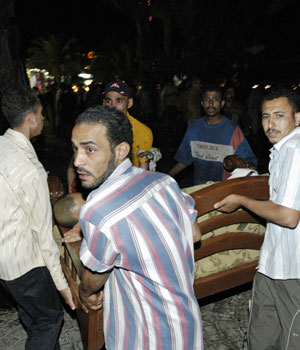
Rescuers carry an injured victim after three explosions shook the Egyptian Red Sea resort of Dahab, April 24, 2006 (REUTERS)
DAHAB, Egypt,(Reuters) – Bombers have struck again at a resort in Egypt’s Sinai peninsula, killing at least 23 people in three nearly simultaneous explosions in a market and restaurant area popular with foreign tourists.
The dead in the budget resort of Dahab, a beach and diving centre for backpackers, included a young German boy and two other foreigners, the Egyptian Interior Ministry said.
Sixty-two people were wounded in the bombings on Monday evening, including three Danes, three Britons, two Italians, two Germans, two French people, a South Korean, a Lebanese, a Palestinian, an American, an Israeli and an Australian, it said.
On Tuesday morning pools and trails of blood remained on a long stretch of the beach promenade, which is lined with restaurants on the seaside and souvenir shops on the other.
A child’s buggy lay on its side alongside a child’s bloodied shoe. Injured people left bloody footprints on the paving.
“We saw many dead people. People were screaming,” said a cafe worker near the scene of one explosion, who like many other witnesses requested anonymity.
There was no immediate claim of responsibility, but the attack bore many of the hallmarks of the mysterious Sinai-based group which attacked the Hilton hotel in the resort of Taba to the north of Dahab in October 2004 and the upmarket resort of Sharm el-Sheikh to the south in July 2005.
In all cases, three bombs went off within minutes of each other on the evening of a holiday. In some cases the bombers used trucks, in others they left explosives in suitcases.
The governor of South Sinai, Mohamed Hani, told Reuters the blasts on Monday were suicide attacks, but Interior Minister Habib el-Adli said it was too early to judge.
Security sources in Sinai said initial investigations suggested the attackers had planted bombs.
Witnesses who saw the damage in Sharm el-Sheikh said the bombs appeared to be smaller this time. Several government officials called the devices simple or primitive.
The Interior Ministry said the targets were a restaurant, a cafe and a supermarket in the small resort, which lies 80 km (50 miles) north of better-known Sharm el-Sheikh.
At the Lantern, a Chinese restaurant on the beachfront, one employee said he was inside when he heard the first of the bombs at about 7.10 p.m. (1710 GMT).
“I came outside and saw a person on fire and others with cuts on their head and arms. Some people had lost their fingers or their feet,” said the worker, who identified himself as Ahmed.
“The summer is just coming and there were lots of bookings but now it will be a disaster,” he added.
After the previous attacks, many tourists cut short their holidays and went home. But the resorts had largely recovered from those attacks within months, despite occasional warnings that the Sinai group could still be active.
The Egyptian authorities have attributed the series of attacks to a small group founded by a man of Palestinian origin who grew up in the north Sinai town of El Arish and had adopted the views of militant Islamists.
They say the group has no known links with foreign organisations such as the al Qaeda group of Osama bin Laden.
The alleged founder, Iyad Said Saleh, died in the bombing at the Taba Hilton, apparently because he mistimed his bomb, Egyptian police said at the time.
The Interior Ministry said police killed several other important members over the next few months after deploying thousands of police in the rugged mountains of the peninsula.
Several groups claimed responsibility for the Taba and Sharm el-Sheikh attacks but specialists in militant Islamist groups said they did not take any of the claims seriously.
The Sharm el-Sheikh bombings, which killed at least 67 people, thwarted the Egyptian government’s plans to attract 9 million tourists to the country in 2005.
Coupled with a strong Egyptian pound and weaker European economies, it held growth in tourism down to 5 percent, with 8.5 million people visiting the country.
Tourists, who come for the beaches and the pharaonic remains, bring in more than $7 billion a year in foreign currency. The tourism industry employs 10 percent of the Egyptian workforce.

Egyptian investigators collect evidence near the place where one of three explosions which took place in the touristic resort of Dahab 25 April 2006 (AFP)

An overview of the resort town of Dahab in Sinai, Egypt early in the morning following the triple bombing last night that left at least 23 people dead (EPA)
